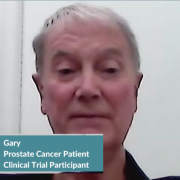Seeking Optimal Prostate Cancer Care? The Importance of Partnering With a Specialist
Seeking Optimal Prostate Cancer Care? The Importance of Partnering With a Specialist from Patient Empowerment Network on Vimeo.
As prostate cancer treatment options continue to expand, it’s important to partner with a physician who is up-to-date on the latest developments. Dr. Alicia Morgans explains why patients should consider seeking a specialist and obtaining a second opinion.
Dr. Alicia Morgans is an Assistant Professor of Medicine at the Robert H. Lurie Comprehensive Cancer Center of Northwestern University.
See more from The Pro-Active Prostate Cancer Patient Toolkit
Related Resources

Three Key Steps to Take Following a Prostate Cancer Diagnosis |

Are You Prepared for Your Prostate Cancer Appointment? Expert Tips |

Prostate Cancer Treatment Decisions: Which Path is Best for YOU? |
Transcript:
Dr. Alicia Morgans:
Over the last few years, prostate cancer treatment has been incredibly complicated. And I think I and many in the prostate cancer community would absolutely recommend that men with prostate cancer seek out a prostate cancer specialist to make sure that he has access to someone to get advice and medical recommendations that are going to be the most up-to-date.
It’s incredible to me that in the last few years there have actually been multiple new medications that have been approved, even some as recently as about a month and a half ago. And this landscape that we have to try to take care of men and help them live longer and feel better is constantly changing and hopefully broadening as we find more ways to take care of men with prostate cancer.
And the people that know that best are going to be specialists. And they include medical oncologists, urologists, and radiation oncologists, as well as some palliative care doctors who can really help with being specialists in pain control, constipation, appetite issues, energy issues. So, having a team of specialists is really critical. And it doesn’t necessarily mean that you need to see that specialist for every single appointment that you have for treating your prostate cancer, because many men in the United States who have prostate cancer don’t live very close to a large center where there might be a prostate cancer specialist.
Many men that I take care of actually live several hours away and come to see me once every six months or once a year or if they need advice because something has changed about their cancer. And that is completely okay, and actually, really, I think, a nice way to balance the convenience of having care close to home while still making sure that you have access to someone who is actively engaged in participating in the work to advance therapeutics and other ways of caring for prostate cancer.
Sometimes it can feel like you’re hurting feelings or potentially even offending your doctor if you say that you want to see someone else to get a second opinion or just to get another bit of advice about your cancer. But I think, and I think most doctors think, that at the end of the day part of dealing with cancer is making sure that you have the right treatment for the disease.
But part of taking care of people with cancer and dealing with cancer if you are the patient is making sure that your mind is at peace, that you have tried everything, and looked in every corner to find what you need to get the help that you really do deserve. And I think as we care for men with prostate cancer, we physicians know that we may have the answers for most but not all men, or we may not necessarily have an area of specialty in the particular issue that that man needs help with.
And so, we’re always open – I think I am. And I’m sure most doctors are, too – encouraging people, in fact, to seek second opinions if that’s what they need to either feel like they have access to the treatments that they need or to put their minds at ease. Because it really is the combination of physical care and emotional and mental care that is necessary to heal yourself while you are taking care of yourself with prostate cancer.










